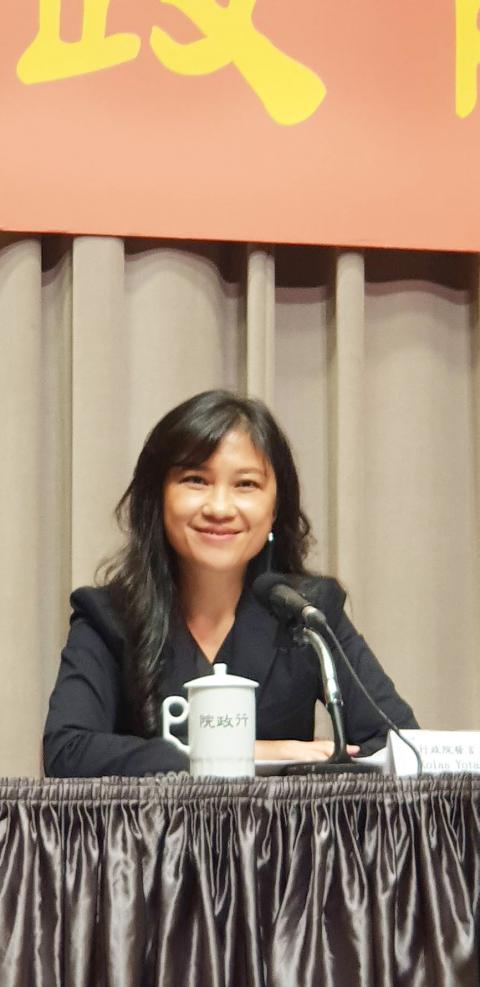Premier William Lai (賴清德) will next year present clear-cut goals for the government’s plan to make English a second official language, Executive Yuan spokeswoman Kolas Yotaka said yesterday.
The Ministry of Education will present an official report to Lai in the next few weeks on its recommendations for adopting English as an official language alongside Mandarin, Kolas said, after Lai discussed the issue in an interview with the Chinese-language Economic Daily News published yesterday.
“I will set a policy goal next year to make Taiwan a bilingual country, with English and Chinese being its official languages,” Lai said in the interview.

Photo: Lee Hsin-fang, Taipei Times
Lai late last year directed the ministry to form a “Committee to Promote English as an Official Language,” which was tasked with studying the issue, carrying out public surveys and drafting a plan on how to achieve the goal.
The ministry submitted the committee’s first report to Lai in June and is expected to present the second and final one by the end of this week or early next month, Kolas said.
The second report is to focus on ways and means of improving English teaching in schools, including establishing bilingual schools or classes and emphasizing spoken English, she said.
It will also deal with legislative issues such as the feasibility of deregulation to help promote a broad bilingual environment, Kolas said.
Earlier this year, then-minister of education Pan Wen-chung (潘文忠) told the Central News Agency in an interview that English competence did not equate to competitiveness, but it lays a foundation on which people can collect accurate information in a timely way, showcase professional expertise or express ideas without language barriers in the international arena, giving them a competitive edge.
“English proficiency opens up opportunities for young people,” Pan said. “We must do this for the next generation.”
Lai, who initiated a similar program in Tainan when he was mayor, has spearheaded the push to make English an official national language.

Intelligence agents have recorded 510,000 instances of “controversial information” being spread online by the Chinese Communist Party (CCP) so far this year, the National Security Bureau (NSB) said in a report yesterday, as it warned of artificial intelligence (AI) being employed to generate destabilizing misinformation. The bureau submitted a written report to the Legislative Yuan in preparation for National Security Bureau Director-General Tsai Ming-yen’s (蔡明彥) appearance before the Foreign Affairs and National Defense Committee today. The CCP has been using cognitive warfare to divide Taiwanese society by commenting on controversial issues such as Taiwan Semiconductor Manufacturing Co’s (TSMC, 台積電) investments in the

INVESTIGATION: The case is the latest instance of a DPP figure being implicated in an espionage network accused of allegedly leaking information to Chinese intelligence Democratic Progressive Party (DPP) member Ho Jen-chieh (何仁傑) was detained and held incommunicado yesterday on suspicion of spying for China during his tenure as assistant to then-minister of foreign affairs Joseph Wu (吳釗燮). The Taipei District Prosecutors’ Office said Ho was implicated during its investigation into alleged spying activities by former Presidential Office consultant Wu Shang-yu (吳尚雨). Prosecutors said there is reason to believe Ho breached the National Security Act (國家安全法) by leaking classified Ministry of Foreign Affairs information to Chinese intelligence. Following interrogation, prosecutors petitioned the Taipei District Court to detain Ho, citing concerns over potential collusion or tampering of evidence. The

‘COMPREHENSIVE PLAN’: Lin Chia-lung said that the government was ready to talk about a variety of issues, including investment in and purchases from the US The National Stabilization Fund (NSF) yesterday announced that it would step in to staunch stock market losses for the ninth time in the nation’s history. An NSF board meeting, originally scheduled for Monday next week, was moved to yesterday after stocks plummeted in the wake of US President Donald Trump’s announcement of 32 percent tariffs on Taiwan on Wednesday last week. Board members voted to support the stock market with the NT$500 billion (US$15.15 billion) fund, with injections of funds to begin as soon as today. The NSF in 2000 injected NT$120 billion to stabilize stocks, the most ever. The lowest amount it

NEGOTIATIONS: Taiwan has good relations with Washington and the outlook for the negotiations looks promising, Minister of Economic Affairs J.W. Kuo said Taiwan’s GDP growth this year is expected to decrease by 0.43 to 1.61 percentage points due to the effects of US tariffs, National Development Council (NDC) Minister Paul Liu (劉鏡清) said at a meeting of the legislature’s Economics Committee in Taipei yesterday, citing a preliminary estimate by a private research institution. Taiwan’s economy would be significantly affected by the 32 percent “reciprocal” tariffs slapped by the US, which took effect yesterday, Liu said, adding that GDP growth could fall below 3 percent and potentially even dip below 2 percent to 1.53 percent this year. The council has commissioned another institution